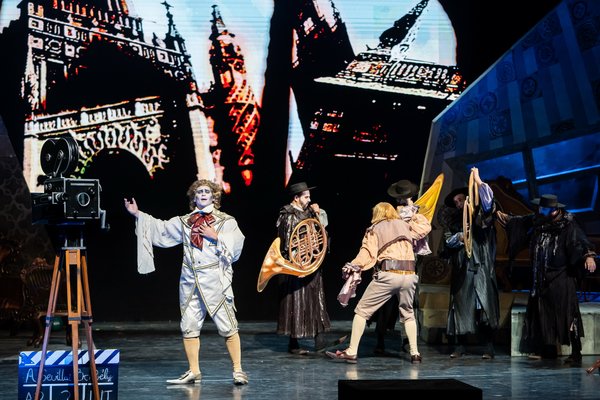
IL BARBIERE DI SIVIGLIA
In Brief
Opera in two acts, in Italian, with Hungarian and English surtitles
It is safe to say that one of the most beloved and most performed works in the comic opera genre is Gioachino Rossini's Il barbiere di Siviglia. Thus, it cannot be missing from the OPERA repertoire. In the 2023/24 season we saw the revival of Csaba Káel's previous staging, which was originally performed in Szombathely in the summer of 2016 and then at Müpa Budapest, but only for a few times. The director, who has already entertained audiences at the Opera House, the Erkel Theatre, and the Eiffel Art Studios with numerous other productions, places this work in the silent film era, magnifying the humorous situations in a lighter and endlessly witty musical setting. The production also seeks to dust off the centuries-old traditions of performance and to present the opera in its original freshness. “This slight modernity of this 19th-century piece was much needed, it made it so much more enjoyable and digestible” reads one audience review.
Synopsis
Act I
Count Almaviva has fallen in love with Rosina, Doctor Bartolo’s ward, a girl of no rank – so much so that he would even risk mésalliance. What he does not know yet is how to win her heart. We find him wandering outside Bartolo’s well-guarded residence, but all he can achieve with his serenade given with an occasional band is to awaken the whole household. It is at this moment when Figaro appears. The profession of a barber is hardly more than an excuse for him to go in and out of houses, deliver messages from ladies to gentlemen, solve problems, make business, complicate lives and loves… and collect coins given as a tip. Figaro is a frequent visitor in Bartolo’s house, so only a little trick is needed to assist the Count closer to his aim. Disguised as a poor student called Lindoro, the Count declares his love to Rosina, but does not have the chance to hear the long-awaited answer because the serenade arranged by Figaro is disturbed.
Bartolo hears the news that Count Almaviva is in the city; and has the feeling that something is wrong around the house. He decides to marry Rosina – and her dowry – the very same day, and hurries to Basilio. Figaro also sets to work and makes new plans: he is about to disguise Count Almaviva as a drunken soldier and get him inside the house with the help of a faked billet. The enamoured Rosina is determined to do anything she can to rid herself of Bartolo and his house. She writes a letter to Lindoro offering her love and asking to be saved. But how could she deliver the message to a young man she does not know? Figaro appears and hides in the room where he overhears a conversation between Basilio and Bartolo. Calling himself a “maestro”, Basilio is willing to do anything for money, including slander and swindle. He and Bartolo decide to construct the marriage certificate at once and contract the marriage that very day. Figaro informs Rosina about all this and departs to deliver the letter to the Count.
Bartolo discovers that the girl has been carrying on a secret correspondence; he lists undeniable evidence one after the other, but Rosina, scared of nothing, perseveres and is unwilling to admit it – Bartolo bursts with anger. Almaviva, disguised as an intoxicated soldier, rushes into Bartolo’s house demanding to be quartered. However tricky the girl is, and however determined Almaviva may be, Bartolo will not give in. Passions flare, the Count loses temper and makes a rush at Bartolo – even Figaro cannot calm him down. Hearing the wrangle, patrolling policemen turn up unexpectedly. They arrest the Count and are about to take him to prison. There is no way out: Almaviva reveals his identity to the officer. He is astonished, shocked, then scared – the Count is set free. No one understands the situation, and confusion explodes.
Act II
Almaviva, dressed as a music teacher, turns up in the doctor’s house insisting that he has come to give a music lesson to Rosina instead of the ailing Basilio. To dispel Bartolo’s suspicion, the Count hands the girl’s letter over to him. He claims to have come across it by chance and suggests that it should be a most suitable means for discrediting Almaviva. In spite of all this, Bartolo decides to be present at the singing lesson. He is not deterred even by the fact that the only time when Figaro can shave him is that very moment. The clever barber takes advantage of the situation by filching the key of Rosina’s balcony. Less comforting is the fact that Basilio enters unexpectedly. Only arguments as heavy as the Count’s purse can make him leave. In spite of this, Bartolo exposes the careless lovers, and drives them out of the room. The doctor, who is afraid of another trick, sends Basilio for the notary so that the marriage could soon be carried through.
Bartolo shows Rosina the ominous letter to convince her that Lindoro is a false-hearted and deceitful man who wants to hand her over to Count Almaviva. Rosina is so distressed that he agrees to marry her guardian and reveals to him Figaro’s plans concerning her elopement. While Bartolo runs away for the police in the stormy night, the Count and the barber climb through the window to confront a desperate and exasperated Rosina.
The misunderstandings are immediately cleared up when “Lindoro” exposes himself – and the guardian’s intrigue; he convinces the girl that the poor student and the powerful Count Almaviva are the same person. The happy lovers now manage to take advantage of Bartolo’s trap. The notary, arriving in the decisive moment, soon marries them, and Basilio’s corruptness also proves to be beneficial – only the threat of a pistol is needed. The singing tutor thus becomes a witness who verifies the signing of Almaviva and Rosina’s marriage contract. Naturally it is his employer, arriving too late with the policemen, who has to be disappointed.
Gallery
Reviews
"The performance enchanted the audience not only with its special milieu, charming humour, captivatingly witty, dynamic and playful music: we saw great performances in terms of both singing and acting. (...) The combination of modern and traditional elements – which characterised the entire production – created the feeling that the story could take place anywhere, anytime. This simultaneously innovative and timeless approach, as well as the momentum and humour of the performance, can contribute to making classical music attractive to a wide range of people of different ages and musical tastes."
Orsolya Tukács, Magyar Nemzet
